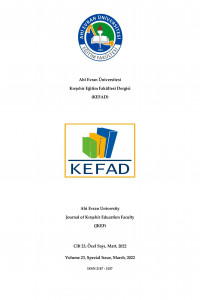İlköğretim Matematik Öğretmen Adaylarının Çevrimiçi Öğrenmeye Yönelik Öz-Yeterlik Düzeylerinin Çeşitli Değişkenler Açısından İncelenmesi
Abstract
Bu çalışmada, öğretmen adaylarının çevrim içi öğrenmeye yönelik öz-yeterlilik düzeyleri belli değişkenler açısından kesitsel tarama yöntemiyle araştırılmıştır. Çalışmanın örnekleminin belirlenmesinde kolay ulaşılabilir durum örneklemesi yöntemi ile çalışmaya katılmaya gönüllü olan ve İç Anadolu bölgesinde yer alan 4 farklı üniversitenin Eğitim Fakültesinin İlköğretim Matematik Öğretmenliğinde öğrenim gören toplam 562 öğretmen adayına ulaşılmıştır. Çalışmada Sun ve Rogers (2020) tarafından geliştirilen çevrim içi öğrenmeye yönelik özyeterlilik ölçeği Türkçeye uyarlanarak kullanılmıştır. Öğretmen adaylarının çevrim-içi öğrenmeye yönelik özyeterlilik düzeyleri cinsiyete bağlı olarak anlamlı bir farklılık göstermediği sorusuna cevap bulmak adına bağımsız t testi, öğretmen adaylarının çevrim-içi öğrenmeye yönelik özyeterlilik düzeylerinin sınıf düzeyine bağlı olarak anlamlı bir farklılık gösterip göstermediği sorularına cevap bulmak adına tek yönlü varyans analizi kullanılmıştır. Öğretmen adaylarının çevrimiçi öğrenme öz-yeterlik ölçeğinin teknoloji kullanımı, çevrimiçi öğrenme görevi, eğitici ve akran etkileşimi ve iletişimi ve öz düzenleme ve motivasyon alt boyutlarındaki puan ortalamaları iyi düzeyde bulunmuştur. Öğretmen adaylarının sadece teknoloji kullanımı öz-yeterlik düzeyleri açısından kız öğrenciler lehine anlamlı bir farklılığın olduğu, ölçeğin diğer boyutları açısından cinsiyet bazlı anlamlı bir farklılığın olmadığı tespit edilmiştir. Öğretmen adaylarının eğitici ve akran etkileşimi ve iletişimi öz-yeterlik düzeyleri açısından 1. ve 3. sınıf arasında 1. sınıf lehine ve 3. ve 4. sınıf arasında 4. sınıf lehine anlamlı bir farklılığın olduğu tespit edilmiştir. Diğer boyutlar açısından sınıf düzeyleri arasında anlamlı bir farklılık tespit edilememiştir. Çalışmanın sonuçlarına göre çeşitli öneriler sunulmuştur.
References
- Altunçekiç, A., Yaman, S., & Koray, Ö. (2005). Öğretmen adaylarının öz-yeterlik inanç düzeyleri ve problem çözme becerileri üzerine bir araştırma (Kastamonu İli Örneği). Kastamonu Eğitim Dergisi, 13(1), 93-102.
- Artino A. R., & McCoach, D.B. (2008). Development and initial validation of the online learning value and self-efficacy scale. Journal of Educational Computing Research. 38(3), 279-303.
- Baltacı, S., & Yıldız, A. (2015). GeoGebra 3D from the perspectives of elementary pre-service mathematics teachers who are familiar with a number of software programs. Cypriot Journal of Educational Sciences, 10(1), 12-17.
- Baltacı, S., Yıldız, A., & Kösa, T. (2015). Analitik geometri öğretiminde GeoGebra yazılımının potansiyeli: Öğretmen adaylarının görüşleri. Türk Bilgisayar ve Matematik Eğitimi Dergisi, 6(3), 483-505.
- Bandura, A. (1977). Social learning theory. Englewood Cliffs, NJ: Prentice-Hall.
- Bandura, A. (1994). Self-efficacy. In V. S. Ramachaudran (Ed.), Encyclopedia of human behavior (Vol. 4, pp. 71-81). New York: Academic Press. (Reprinted in H. Friedman [Ed.], Encyclopedia of mental health. San Diego: Academic Press, 1998).
- Bandura, A. (2006). Guide for constructing self-efficacy scales. In F. Pajares & T. Urdan (Eds.), Adolescence and education: Vol. 5. Self-efficacy beliefs of adolescents (pp. 307–337). Charlotte, NC: IAP-Information Age Publishing.
Investigation of Primary School Mathematics Teacher Candidates' Self-Efficacy Levels for Online Learning in Terms of Various Variables
Abstract
In this study, pre-service teachers' self-efficacy levels for online learning were investigated in terms of certain variables by cross-sectional survey method. In determining the sample of the study, a total of 562 teacher candidates who volunteered to participate in the study with the easily accessible case sampling method and were educated in the Primary Education Mathematics Teaching Department of the Education Faculty of 4 different universities in the Central Anatolia region were reached. In the study, the self-efficacy scale for online learning developed by Sun and Rogers (2020) was adapted into Turkish and used. In order to find an answer to the question that the self-efficacy levels of pre-service teachers for online learning do not differ significantly depending on gender, independent t-test, one-way analysis of variance to find answers to the questions of whether the self-efficacy levels of pre-service teachers for online learning show a significant difference depending on the grade level. used. The mean scores of the pre-service teachers in the sub-dimensions of technology use, online learning task, educator and peer interaction and communication, self-regulation and motivation of the online learning self-efficacy scale were found to be at a good level. It was determined that there was a significant difference in favor of female students only in terms of technology use self-efficacy levels of teacher candidates, but there was no gender-based significant difference in terms of other dimensions of the scale. It has been determined that there is a significant difference between the 1st and 3rd grades in favor of the 1st grade and between the 3rd and 4th grades in favor of the 4th grade in terms of teacher candidates' educator and peer interaction and communication self-efficacy levels. No significant difference was found between grade levels in terms of other dimensions. Various suggestions were presented according to the results of the study.
References
- Altunçekiç, A., Yaman, S., & Koray, Ö. (2005). Öğretmen adaylarının öz-yeterlik inanç düzeyleri ve problem çözme becerileri üzerine bir araştırma (Kastamonu İli Örneği). Kastamonu Eğitim Dergisi, 13(1), 93-102.
- Artino A. R., & McCoach, D.B. (2008). Development and initial validation of the online learning value and self-efficacy scale. Journal of Educational Computing Research. 38(3), 279-303.
- Baltacı, S., & Yıldız, A. (2015). GeoGebra 3D from the perspectives of elementary pre-service mathematics teachers who are familiar with a number of software programs. Cypriot Journal of Educational Sciences, 10(1), 12-17.
- Baltacı, S., Yıldız, A., & Kösa, T. (2015). Analitik geometri öğretiminde GeoGebra yazılımının potansiyeli: Öğretmen adaylarının görüşleri. Türk Bilgisayar ve Matematik Eğitimi Dergisi, 6(3), 483-505.
- Bandura, A. (1977). Social learning theory. Englewood Cliffs, NJ: Prentice-Hall.
- Bandura, A. (1994). Self-efficacy. In V. S. Ramachaudran (Ed.), Encyclopedia of human behavior (Vol. 4, pp. 71-81). New York: Academic Press. (Reprinted in H. Friedman [Ed.], Encyclopedia of mental health. San Diego: Academic Press, 1998).
- Bandura, A. (2006). Guide for constructing self-efficacy scales. In F. Pajares & T. Urdan (Eds.), Adolescence and education: Vol. 5. Self-efficacy beliefs of adolescents (pp. 307–337). Charlotte, NC: IAP-Information Age Publishing.
Details
| Primary Language | Turkish |
|---|---|
| Subjects | Other Fields of Education |
| Journal Section | Research Articles |
| Authors | |
| Publication Date | March 26, 2022 |
| Published in Issue | Year 2022 Volume: 23 Issue: Özel Sayı |


